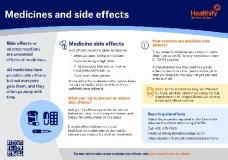Fluconazole
Sounds like 'floo-kon-ah-zole'
Key points about fluconazole
- Fluconazole is an antifungal medicine used to treat infections caused by fungi.
- Fluconazole is also called Canesoral®, Diflucan® or Flonazol®.
- Find out how to take it safely and the possible side effects.

Fluconazole is an antifungal medicine used to treat fungal and yeast (a type of fungus) infections. It works by stopping the growth of fungi that cause infections.
It’s used for vaginal thrush (candidiasis), oral thrush and skin infections such as athlete’s foot and pityriasis versicolor.
Fluconazole is also commonly called Canesoral®, Diflucan® or Flonazol®.
You can buy a fluconazole 150 mg capsule, as a 1 dose treatment for vaginal thrush, over the counter from pharmacies. Other strengths and forms are only available with a prescription from a prescriber.
In Aotearoa New Zealand, fluconazole is available as capsules (50 mg, 150 mg and 200 mg), a liquid (50 mg in 5 mL). It can also be given as an injection in the hospital.
- The dose of fluconazole will be different depending on the type of infection being treated, how severe the infection is and your age.
- The usual dose for adults ranges from 50 mg up to 400 mg once a day, depending on what it's being used for.
- The dose for children will depend on their body weight.
- Your healthcare provider will advise you how long to take fluconazole for. It may be prescribed as a 1-day treatment or taken once daily for up to 6 weeks.
- Always take your fluconazole exactly as your healthcare provider has told you. The packaging or pharmacy label on your medicine will tell you how much to take, how often to take it and any special instructions.
- Timing: Take fluconazole at the same time each day.
- Food: Take fluconazole capsules with food.
- Capsules: Swallow the capsules with a drink of water. Don’t chew them.
- Liquid fluconazole: Shake the bottle well and use an oral syringe or measuring spoon to measure each dose.
- Missed dose: If you forget to take your dose, take it as soon as you remember. But if it's nearly time for your next dose, take the next dose at the usual time. Don’t take 2 doses at the same time to make up for a forgotten dose.
- Finish the course: It’s best to take the whole course of treatment for the number of days your healthcare provider has told you to. You should start to get better after a few days. If you don’t feel better, or get more unwell, contact your healthcare provider. Don't stop taking it, even if you feel your infection has cleared up.
Here are some things to know when you're taking fluconazole. Other things may be important as well, so ask your healthcare provider what you should know about.
- Driving: Be careful when driving or using tools until you know how this medicine affects you.
- Alcohol: Fluconazole can make you feel tired or dizzy. Limit or avoid drinking alcohol while taking fluconazole. Alcohol may increase these side-effects.
- Other medicines: Fluconazole interacts with some medicines, herbal supplements and rongoā Māori, so check with your healthcare provider before starting fluconazole and before starting any new products. Check with your pharmacist before taking any over-the-counter anti-inflammatories such as diclofenac (eg, Voltaren Rapid) or ibuprofen (eg, Nurofen). These can also be found in cold and flu medicines.
- Pregnancy or breastfeeding: Talk to your healthcare provider if you're pregnant, planning a pregnancy or want to breastfeed.
Like all medicines, itraconazole can cause side effects, although not everyone gets them. If you're concerned about any symptoms you think might be related to your medicine, talk to your healthcare provider. The following information offers some guidance but doesn't include all possible side effects.
Tell your healthcare provider if these side effects bother you.
- Headache.
- Feeling sick (nausea) or a sore tummy.
- Diarrhoea (runny poos).
- Feeling dizzy.
Tell your healthcare provider immediately or phone Healthline free on 0800 611 116 if these occur:
- Skin rash or itching.
- Signs of problems with your liver such as yellowing of the skin or eyes, dark urine, pain in the abdomen.
- Signs of problems with your heart such as trouble breathing, sudden weight gain, swelling ankles or feet or feeling very tired.
- Seizures.
- Signs of problems with your red blood cells such as infection (fever, sore throat) or unusual bruising or bleeding.
Phone 111 for an ambulance or go to your nearest accident and emergency (A&E) clinic if these occur:
- Signs of an allergic reaction such as itchy skin, and rash, swollen lips or tongue, problems breathing, like a tight chest or shortness of breath.
Read more about medicines and side effects and reporting a reaction you think might be a side effect.
The following links have more information on fluconazole:
Fluconazole (for vaginal thrush)(external link) New Zealand Formulary Patient Information
Fluconazole (capsule and liquid)(external link) New Zealand Formulary Patient Information
Fluconazole (injection)(external link) New Zealand Formulary Patient Information
Fluconazole(external link) Medsafe Consumer Medicine Information, NZ
Flucazole(external link) Medsafe Consumer Medicine Information, NZ
Brochures
Medicines and side effects(external link) Healthify He Puna Waiora, NZ, 2024
5 questions to ask about your medications(external link) Health Quality and Safety Commission, NZ, 2019 English(external link), te reo Māori(external link)
References
- Fluconazole(external link) New Zealand Formulary
- Triazole antifungals(external link) New Zealand Formulary
- Fluconazole(external link) Medsafe datasheet, NZ
- Canesoral®(external link) Medsafe datasheet, NZ
Brochures

Medicines and side effects
Healthify He Puna Waiora, NZ, 2024

Health Quality and Safety Commission, NZ, 2019 English, te reo Māori
Credits: Healthify editorial team. Healthify is brought to you by Health Navigator Charitable Trust.
Reviewed by: Angela Lambie, Pharmacist, Auckland.
Last reviewed:





